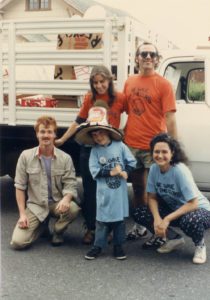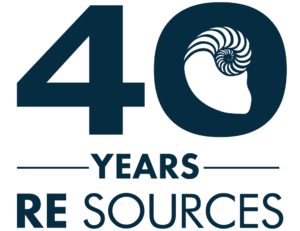
It’s 1982. E.T. is playing in theaters across the country. People sip a new-fangled artificially sweetened soda called Diet Coke, probably while listening to Michael Jackson’s Thriller in their Ford Escort. New products were hitting shelves every week, and the massive waste of usable materials was a growing concern.
Here in Whatcom County that spring, an intrepid group of volunteers started piloting a wild idea: curbside recycling, collected by volunteers in several city neighborhoods. It soon became the largest volunteer-run recycling program in the U.S. The service would eventually open the first RE Store and later become RE Sources.
By 1984, the group incorporated as Bellingham Community Recycling and began a local Recycling Hotline, public education programs and recycling presentations in schools. In 1989, BCR changed its name to Environmental Resource Services (later shortened to RE Sources) to reflect an environmental focus that had grown beyond recycling alone. That same year, after the community had fully embraced recycling, the City of Bellingham adopted a city-run program with the three-color sorted bins we know and love now. In 1999, we became the 25th member of the Waterkeeper Alliance — an international nonprofit that strengthens and grows a global network of grassroots leaders protecting everyone’s right to clean water — with the creation of the North Sound Baykeeper program.
That ethic of civic engagement is what informs our work to this day — Northwest Washingtonians have shown time and again that they can secure better policies and protections for natural functions that work for us all.
Where would our region be without 40 years of RE Sources?
While kayaking near Cherry Point in 2003, our then-North Sound Baykeeper Wendy Steffenson noticed the water was covered with white dust. As she neared the Intalco aluminum plant’s dock, she could see that metal ore was being taken off a barge with a scoop that leaked contaminants onto the water’s surface. This was in violation of Intalco’s pollution permit. A call from Wendy helped start the process of the Department of Ecology working with Intalco to correct the problem.
This is just a snapshot. It’s difficult to quantify the hard work of RE Sources staff and supporters over the years. The cumulative impact of small actions is certainly large — giving technical expertise on natural resource policy to local governments, urging Whatcom residents to write lawmakers supporting clean water or renewable energy, getting professionals to clean up hundreds of small pollution sources like oil leaks or lead paint from boats, and much more. Some of these routine actions by individuals catalyzed sweeping changes.
Here are just a few ways we’ve supported Northwest Washington communities to protect the natural environment we all rely on:
- Hosting regular beach cleanups since 1986, collecting hundreds of pounds of would-be marine plastic pollution every year.
- Patrolling waterways for pollution since 1996, and training local residents on how to detect and report marine pollution from kayaks or canoes.
- Convened the Whatcom Water Citizen Oversight Panel (COPS) to oversee industrial stormwater permitting processes in 1997.
- After the 1999 Olympic Pipe Line gas explosion killed three children, devastated the community and polluted Whatcom Creek, RE Sources and others started SAFE Bellingham to ensure pipeline safety issues and creek restoration were dealt with comprehensively.
- Restoring Bellingham’s industrial waterfront: In 1999 we created the Georgia-Pacific Good Neighbor Campaign, generating over 1,000 postcards and letters to the GP mill and corporate headquarters. Through community meetings and other outreach we gathered more than 3,000 signatures petitioning the Department of Ecology to require that GP phase out the use and discharge of mercury, dioxins and other harmful chemicals by 2004. We have been involved in getting the public engaged in the state’s toxic cleanup process ever since. The work has been slow, but we saw a milestone success in 2018 when the first public park and salmon-friendly pocket beach was reopened at Waypoint Park. Looking forward, a long remediation process at the Cornwall landfall is slated to culminate with the creation of a waterfront public park by 2024.
- Our Sustainable Schools program has evolved since 1987, providing thousands of K-12 students with free in-class programs on waste reduction, water system science and more that supplement teachers’ curricula. Since 2020, the team has shifted its focus to providing teachers with free trainings to bring the pressing issues of our era into the classroom, as well as give students outlets for action through the Green Team network and Youth for the Environment and People (YEP!).
- Alongside partners, we’ve held polluters legally accountable in 16 Clean Water Act citizen suits. If warnings and citations don’t deter a polluter, RE Sources sometimes takes legal action as a last resort under the citizen suit provision of the Clean Water Act. Any US citizen can bring lawsuits against those who are breaking the law and polluting waterways. RE Sources makes use of that right as a part of our mission to protect public health and the waters we all depend on. We do not take these lightly, as they are time-intensive for our organization and only considered if other measures fail to curb pollution.
- The RE Store has diverted at least 60,529,200 pounds of waste from the landfill since 1993. That’s the mass of 10,000 elephants (or about 4.7 million raccoons if you prefer)! They have also provided almost 1,200 people job training through the Community Jobs Training Program, which lowers barriers to employment in Bellingham by providing paid, on-site job training to economically disadvantaged members of our community. Today, the program touts an impressive 80% job placement rate.
A decade of protecting Cherry Point
It all started when the word “coal” was uttered without fanfare at a 2011 public meeting that our staff were attending — as we still do, since local government meetings are often where proposals of great consequence happen that may go unnoticed. That’s where we come in, translating the often hard-to-follow public process into information and actions for the community.
RE Sources and other advocates began organizing Salish Sea communities against the Gateway Pacific Terminal in 2012, a coal export terminal proposed for Cherry Point that would have been the largest in North America, as well as the expansion of crude oil shipments and rail transport. These organizing efforts helped Lummi Nation secure a legal win affirming the coal port would have interfered with their treaty-protected fishing rights. Then, after years of work and thousands of community members engagement, Whatcom County finally passed land use code in 2021 prohibiting new fossil fuel refineries, coal plants, transshipment facilities, piers, and wharfs.
This list is nowhere near comprehensive on our decades of protecting human health and the natural systems that support us. But at the end of the day, without RE Sources supporters, Whatcom’s waterways would be more polluted and our community wouldn’t have as much public ownership of the complicated policies that affect our shared environment.
 What could 2062 look like?
What could 2062 look like?
Dreams of flying cars filled peoples’ heads in the 1980s. RE Sources has a more grounded (literally) and achievable vision: A Northwest Washington powered by renewable energy, with abundant salmon and orca populations, clean drinking water, agriculture that’s resilient to climate change, and healthy outdoor spaces we can all enjoy. After two years spent heavily indoors, the value of fresh air and swimmable water cannot be overstated.
We can get our buildings and transportation off harmful fossil fuels. We can create family-wage jobs protecting communities from the brunt of climate change and transitioning to clean electricity. We want to be able to walk the same beaches as today 40 years from now, letting our kids marvel at the eelgrass meadows, herring and salmon at the center of our identities and livelihoods.
From humble beginnings, our tenacious staff and supporters have never shied away from shifting our focus to meet the moment. The focus was recycling and waste reduction until the 1990s, but we soon dove into protecting waterways, challenging risky fossil fuel expansions and more. In recent years we’ve expanded to add climate resilience work, better educational offerings and strategic campaigns to make our region powered by 100% renewable energy as soon as possible.
RE Sources staff, and awesome volunteers and supporters like you, carry on this tradition today when the only constant is change. This is a community that sees a need and fills it, and we’re extremely proud to connect folks with resources they need to make a real difference.
If this work inspires you, help us continue it for a livable future in the Northwest. We rely on generous gifts from the community to keep you, dear reader, engaged and active.

 What could 2062 look like?
What could 2062 look like?